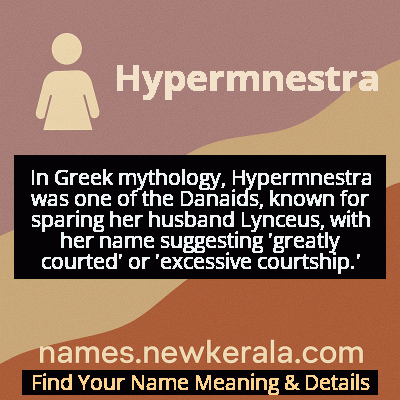Hypermnestra Name Meaning & Details
Origin, Popularity, Numerology Analysis & Name Meaning of Hypermnestra
Discover the origin, meaning, and cultural significance of the name HYPERMNESTRA. Delve into its historical roots and explore the lasting impact it has had on communities and traditions.
Name
Hypermnestra
Gender
Female
Origin
Greek
Lucky Number
9
Meaning of the Name - Hypermnestra
In Greek mythology, Hypermnestra was one of the Danaids, known for sparing her husband Lynceus, with her name suggesting 'greatly courted' or 'excessive courtship.'
Hypermnestra - Complete Numerology Analysis
Your Numerology Number
Based on Pythagorean Numerology System
Ruling Planet
Mars
Positive Nature
Generous, passionate, energetic, and humanitarian.
Negative Traits
Impulsive, impatient, moody, and can be overly emotional.
Lucky Colours
Red, maroon, scarlet.
Lucky Days
Tuesday.
Lucky Stones
Red coral, garnet.
Harmony Numbers
1, 2, 3, 6.
Best Suited Professions
Military, sports, philanthropy, leadership roles.
What People Like About You
Courage, energy, leadership, generosity.
Famous People Named Hypermnestra
Hypermnestra of Greek Myth
Mythological Figure
Defied paternal command to murder husband, preserving Argive royal lineage
Hypermnestra (Literary Character)
Literary Figure
Symbol of marital loyalty in John Dryden's poetic adaptations
Hypermnestra (Operatic Character)
Opera Character
Central figure in Baroque opera exploring love versus duty conflicts
Name Variations & International Equivalents
Click on blue names to explore their detailed meanings. Gray names with will be available soon.
Cultural & Historical Significance
Extended Personality Analysis
Those named Hypermnestra typically exhibit a complex personality marked by profound moral intelligence and emotional depth. They possess an innate ability to discern right from wrong in ethically ambiguous situations, often serving as moral compasses in their social circles. Their decision-making process is characterized by careful consideration of consequences and a deep respect for life and relationships. While fiercely loyal to family and principles, they maintain the courage to dissent when confronted with unjust demands. These individuals often display remarkable emotional resilience, able to withstand social pressure while maintaining their integrity. Their compassion is balanced by strategic thinking, making them effective mediators and advocates. The mythological Hypermnestra's legacy imbues modern bearers with a sense of responsibility to stand against violence and oppression, while her name's meaning ('greatly remembered') suggests a drive to create meaningful, lasting impact through their choices and relationships.
Modern Usage & Popularity
In contemporary naming practices, Hypermnestra remains an extraordinarily rare choice, primarily confined to academic families, mythology enthusiasts, and those seeking names with strong feminist and classical resonances. The name has never ranked in any national popularity charts and is estimated to be used fewer than 50 times per generation globally. Its modern usage peaked during the 19th century classical revival and has seen minor resurgences following popular mythology publications and media adaptations. Current bearers often report that the name shapes their identity, fostering an interest in classical studies, women's rights, and ethical philosophy. While the name's length and complexity present practical challenges, modern parents who choose it typically value its unique historical significance and the powerful narrative of moral courage it represents. The name occasionally appears in literary works and academic discussions as a symbol of ethical resistance.
Symbolic & Spiritual Meanings
Symbolically, Hypermnestra represents the eternal conflict between duty and conscience, serving as a metaphor for moral courage in the face of overwhelming pressure. Her name's etymology—'hyper' (exceeding) and 'mnestra' (remembered or courted)—suggests themes of legacy, exceptional memory, and being highly sought after. She embodies the archetype of the life-preserver against destructive forces, symbolizing hope and continuity in threatened lineages. In psychological terms, Hypermnestra represents the integrated feminine principle that combines nurturing compassion with fierce protection of what matters most. Her story serves as an allegory for personal transformation—from being one of many identical sisters to becoming an individual defined by her unique moral choice. The name carries deep metaphorical weight about the power of a single compassionate act to alter destiny and establish new paradigms of justice and relationship.

